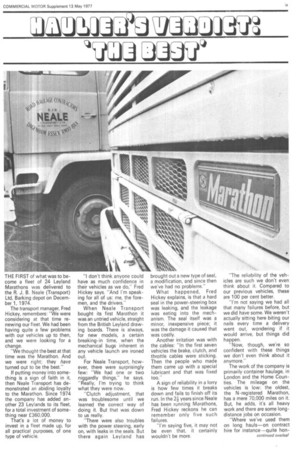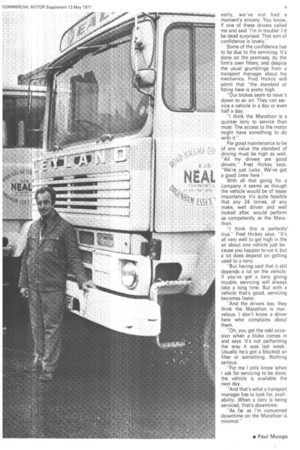JICIa2JJJJ Cal?,
Page 206

Page 208

If you've noticed an error in this article please click here to report it so we can fix it.
4VILI •JJV
THE FIRST of what was to become a fleet of 24 Leyland Marathons was delivered to the R. J. B. Neale (Transport) Ltd, Barking depot on December 1,1974.
The transport manager, Fred Hickey, remembers: "We were considering at that time renewing our fleet. We had been having quite a few problems with our vehicles up to then, and we were looking for a change.
"We thought the best at that time was the Marathon. And we were right; they have turned out to be the best."
If putting money into something is a sign of faith in it, then Neale Transport has demonstrated an abiding loyalty to the Marathon. Since 1974 the company has added another 23 Leylands to its fleet, for a total investment of something near £360,000.
That's a lot of money to invest in a fleet made up, for all practical purposes, of one type of vehicle.
"I don't think anyone could have as much confidence in their vehicles as we do,Fred Hickey says. "And I'm speaking for all of us: me, the foremen, and the drivers."
When Neale Transport bought its first Marathon it was an untried vehicle, straight from the British Leyland drawing boards. There is always, for new models, a certain breaking-in time, when the mechanical bugs inherent in any vehicle launch are ironed out.
For Neale Transport, however, there were surprisingly few: "We had one or two niggardly things," he says. "Really, I'm trying to think what they were now.
"Clutch adjustment, that was troublesome until we learned the correct way of doing it. But that was down to us really.
"There were also troubles with the power steering, early on, with leaks in the seals. But there again Leyland has brought out a new type of seal, a modification, and since then we've had no problems."
What happened, Fred Hickey explains, is that a hard seal in the power-steering box was leaking, and the leakage was eating into the mechanism. The seal itself was a minor, inexpensive piece; it was the damage it caused that was costly.
Another irritation was with the cables: "In the first seven vehicles the brake, clutch, and throttle cables were sticking. Then the people who made them came up with a special lubricant and that was fixed too."
A sign of reliability in a lorry is how few times it breaks down and fails to finish off its run. In the 2 years since Neale has been running Marathons, Fred Hickey reckons he can remember only five such failures.
"I'm saying five, it may not be even that, it certainly wouldn't be more. "The reliability of the vehicles are such we don't even think about it. Compared to our previous vehicles, these are 100 per cent better.
"I'm not saying we had all that many failures before, but we did have some. We weren't actually sitting here biting our nails every time a delivery went out, wondering if it would arrive, but things did happen.
"Now, though, we're so confident with these things we don't even think about it anymore."
The work of the company is primarily container haulage, in London and the Home Counties. The mileage on the vehicles is low: the oldest, the N -registered Marathon, has a mere 70,000 miles on it. But, he adds, it's all heavy work and there are some longdistance jobs on occasion.
"Where we've used them on long hauls—on contract hire for instance--quite hon estly, we've not had a moment's anxiety. You know, if one of these drivers called me and said 'I'm in trouble' I'd be dead surprised. That sort of confidence is lovely."
Some of the confidence has to be due to the servicing. It's done on the premises, by the firm's own fitters, and despte the usual grumblings from a transport manager about his mechanics, Fred Hickey will admit that "the standard of
here is pretty high.
"Our blokes seem to have it down to an art. They can service a vehicle in a day or even half a day.
"I think the Marathon is a quicker lorry to service than most. The access to the motor might have something to do with it."
For good maintenance to be of any value the standard of driving must be high as well. "All my drivers are good drivers," Fred Hickey says. "We're just lucky. We've got a good crew here."
With all that going for a company it seems as though the vehicle would be of lesser importance. It's quite feasible that any 24 lorries, of any make, well driven and well looked after, would perform as competently as the Marathon.
"I think this is perfectly' true," Fred Hickey says. "It's all very well to get high in the air about one vehicle just because you happen to run it, but a lot does depend on getting used to a lorry.
"But having said that it still depends a lot on the vehicle. If you've got a lorry giving trouble, servicing will always take a long time. But with a vehicle that's good, servicing becomes faster, "And the drivers too, they think the Marathon is marvelous. I don't know a driver here who complains about them.
"Oh, you get the odd occasion when a bloke comes in and says 'It's not performing the way it was last week.' Usually he's got a blocked air filter or something. Nothing serious.
"For me I only know when I ask for servicing to be done, the vehicle is available the next day.
"And that's what a transport manager has to look for, availability. When a lorry is being serviced, that's downtime.
"As far as I'm concerned downtime on the Marathon is minimal."
• Paul Mungo























































































































































































































